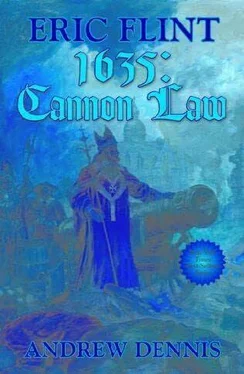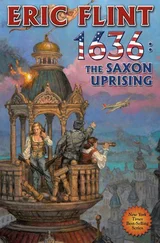Eric Flint - 1635 - The Cannon Law
Здесь есть возможность читать онлайн «Eric Flint - 1635 - The Cannon Law» весь текст электронной книги совершенно бесплатно (целиком полную версию без сокращений). В некоторых случаях можно слушать аудио, скачать через торрент в формате fb2 и присутствует краткое содержание. Жанр: Альтернативная история, на английском языке. Описание произведения, (предисловие) а так же отзывы посетителей доступны на портале библиотеки ЛибКат.
- Название:1635: The Cannon Law
- Автор:
- Жанр:
- Год:неизвестен
- ISBN:нет данных
- Рейтинг книги:3 / 5. Голосов: 1
-
Избранное:Добавить в избранное
- Отзывы:
-
Ваша оценка:
- 60
- 1
- 2
- 3
- 4
- 5
1635: The Cannon Law: краткое содержание, описание и аннотация
Предлагаем к чтению аннотацию, описание, краткое содержание или предисловие (зависит от того, что написал сам автор книги «1635: The Cannon Law»). Если вы не нашли необходимую информацию о книге — напишите в комментариях, мы постараемся отыскать её.
1635: The Cannon Law — читать онлайн бесплатно полную книгу (весь текст) целиком
Ниже представлен текст книги, разбитый по страницам. Система сохранения места последней прочитанной страницы, позволяет с удобством читать онлайн бесплатно книгу «1635: The Cannon Law», без необходимости каждый раз заново искать на чём Вы остановились. Поставьте закладку, и сможете в любой момент перейти на страницу, на которой закончили чтение.
Интервал:
Закладка:
Perhaps that was the plan? Barberini had to admire the audacity of it if it was. To threaten to play Samson in the temple if Borja truly challenged Rome's authority, to make the consequences of disobedience so severe that no one in his right mind would dare-it was all Barberini could do to suppress a smile. Assuming Borja was in his right mind was at best risky. Or that he had a mind to be right in, were one to be brutally candid.
Borja finally spoke, visibly trembling. "I thank Your Holiness for the clarification of these matters," he said, "and by your leave will withdraw from your presence to consider Your Holiness' words in detail."
Urban nodded. "It were better, I think, if We were to declare the day's business at an end and adjourn," with which he rose and left, not pausing to say the customary benediction.
Barberini lost all temptation to smile with that. Was his uncle deliberately provoking the Spaniard? It was the only possible explanation. Had Borja been allowed to flounce out in the rage he was obviously feeling, he might have saved a little face, a matter vitally important to the notoriously touchy Spaniard.
As it was, he was left standing before his chair on the floor of the chamber in which the curia had met, publicly snubbed by the pope after a rebuke that had had all the charm and subtlety of a shovelful of horse-shit to the face. He turned on his heel and stormed out, trailed after a moment's hesitation by his attendants and then, in their turn, the rest of the Spanish cardinals.
Barberini, at least, awaited his proper place in the order of protocol before leaving.
Chapter 3
Rome
Cardinal Gaspar Borja y Velasco, at no time a man other than passionate, was in a mood even he considered unreasonable. Thus far, since arriving at the small villa outside Rome that he was perforce required to use in order not to attract even more papal displeasure, he had snapped at every single member of his clerical staff, insulted two of his aides and taken a swipe at a servant with his stick. His ill temper was not helped in the slightest by the sure knowledge that the day's aggravation would be sure to lead to a sleepless night with dyspepsia.
He took a deep breath. He had serious business to conduct in the remains of the day and it would hardly do to be less than polite to such as the Borghese. Like all Italians they were notoriously touchy. A fine thing in its place, of course, but there were limits. Which, alas, Borja had to respect.
And, of course, their support was now vital. He had done no more than skirt around the possibilities with the conde Olivares back in Madrid, discuss in generalities what might be done to bring a clearly difficult papacy to heel and remove a potential problem in the way of the strategy that Madrid was evolving to place Spain back in her rightful place as chiefest power in Christendom. Here in Rome, after one meeting with the pontiff, he was firmly settled on the proper way to proceed. There really was no alternative, none worth pursuing, and even failure would see Urban VIII sufficiently chastised that there would be no more trouble from Rome for the ten years that the one-time Maffeo Barberini had left on this earth, if the Grantville histories were to be believed.
Cardinal Borja was a firm believer that among the secondary causes through which God worked his divine will in the world the power of His Most Catholic Majesty to order the affairs of men was among the most powerful. To allow that power to be in any way limited and constrained was in a very real way to thwart the will of God, a course of action so fundamentally sinful that any lesser sin might be contemplated in order to avoid committing it.
In the meantime, of course "Is Quevedo y Villega here yet?" he snapped, and realized as he said it that his tone was not yet under control. Not even the sight of gardens in springtime had calmed him. He turned from the window and forced a smile at Ferrigno, who had closed his face to all expression while his master had been simmering. Borja recognized the signs. More than once he had caused the unassuming but efficient little Neapolitan to flinch when he had let loose his passions. Borja could see that his secretary was bracing himself for the storm.
He took a deep breath. "I have no reproof for you, Ferrigno," he said. "You may take it that I am displeased, but not with you." There, that should reassure the man.
Ferrigno nodded. "Your Eminence has heard much to displease him," he said, and the relief in his tone was palpable. "I understand that Senor Quevedo is on his way."
"Good. And Sinceri?"
"He attends Your Eminence's convenience, Your Eminence."
"Send him in, then, and leave us."
Sinceri bore almost no resemblance to what one imagined when the phrase "canon lawyer" was mentioned, still less the phrase "Inquisition Interrogator." Were it not for the clerical dress it would be easy to imagine him as someone's favorite uncle, although his pedantic manner and dryness of phrase also went a long way to dispelling the illusion as soon as he opened his mouth to speak. Someone's crashing bore of an uncle, perhaps.
Sinceri's bow and kiss to Borja's ring were fussy and precise. "Your Eminence," he said. "How may I serve you?"
Borja took a deep breath. Let it out, in a long sigh. "Father Sinceri," he said, "we are, are we not, faced with a problem?"
"Your Eminence?" Sinceri looked genuinely puzzled. "I understand Your Eminence to be concerned at the import of the dispensations concerning consanguineous marriage that the Holy Father recently granted, and I have taken the liberty of preparing a legal opinion-"
He reached into the leather folder he had been carrying for a document.
Borja waved it aside. "I thank you most sincerely for your efforts, and indeed for your consideration in attempting to anticipate my concerns, but it is in regard to another matter I wished to speak with you."
Sinceri's frown of puzzlement grew deeper. "I should be most grateful to be enlightened by Your Eminence."
Borja began to pace. The afternoon's business before the curia still had him simmering. Walking back and forward helped to calm him. "Father Sinceri, I feel it will be helpful if I rehearse a little of the mutual history we have with the current Holy Father."
"The Galileo affair?" Sinceri cocked his head to one side. His professional attention engaged, Borja fancied he looked more than a little like a portly, yet sleek old carrion crow. One with a smattering of gray feathers amid the black, but all the more distinguished looking for them.
Borja nodded. "You are most perceptive, Father Sinceri. The Galileo Affair is indeed that part of our mutual history to which I refer. You will recall, if you please, that the matter was decided wholly without regard to proper inquisitorial procedure, and indeed wholly without regard to the proper rule of canon law."
Sinceri gave a small sniff. "Most-"
His had been a career spent enforcing obedience to the church, and in particular obedience to its hierarchy, and Borja could see that the idea was giving him more than a little trouble. "Most irregular," Sinceri finished after a short, but nevertheless embarrassed pause.
"Irregular?" Borja let a little incredulity come in to his tone. In truth, the sarcasm and bilious humor was not in the least feigned. The conclusion to that sorry business still rankled. The near-picaresque farce of the denouement at Galileo's final hearing had been a mockery of the dignity of the cardinals and of the church that not even the most ribald of the romantic writers of the day would have stooped to.
If nothing else, they would have been jeered in the streets for the shameless slapstick implausibility of the whole business. And he, Cardinal Gaspar Borja y Velasco, had been forced, in what with hindsight could only have been a deliberate and calculated insult, to take part in the whole degrading machination. Borja felt himself flush a little redder in his just and proper indignation at the mere memory.
Читать дальшеИнтервал:
Закладка:
Похожие книги на «1635: The Cannon Law»
Представляем Вашему вниманию похожие книги на «1635: The Cannon Law» списком для выбора. Мы отобрали схожую по названию и смыслу литературу в надежде предоставить читателям больше вариантов отыскать новые, интересные, ещё непрочитанные произведения.
Обсуждение, отзывы о книге «1635: The Cannon Law» и просто собственные мнения читателей. Оставьте ваши комментарии, напишите, что Вы думаете о произведении, его смысле или главных героях. Укажите что конкретно понравилось, а что нет, и почему Вы так считаете.











